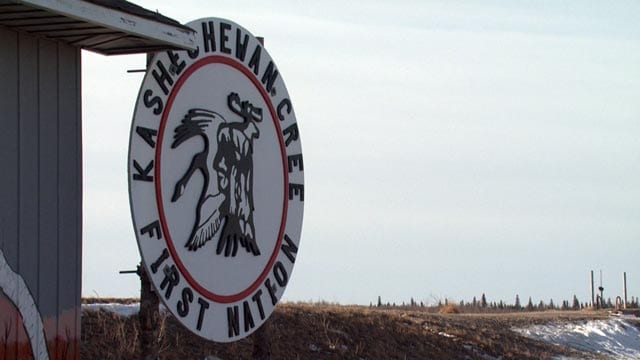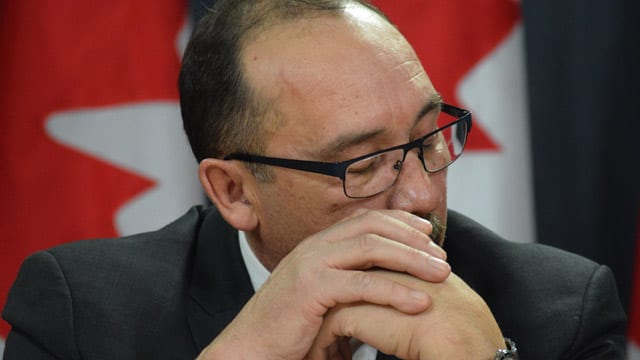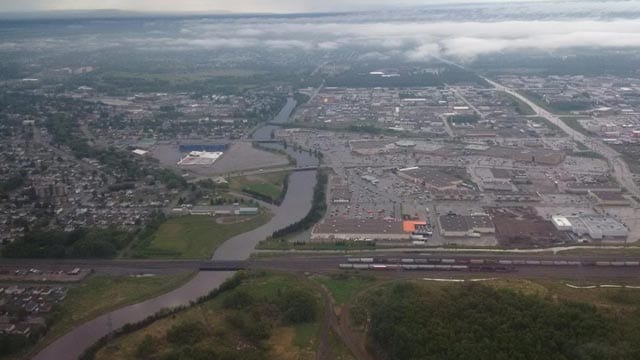
The Department of National Defence is in talks with Kashechewan about building an evacuation camp to help the community get through annual spring flooding.
Normally community members are evacuated to different towns and cities where they hole up in hotels and wait out the flood, but some municipalities have already said they won’t be able to host evacuees this year.
Floriane Bonneville, spokesperson for the minister of national defence, said the government “is looking at options” with the community and leadership.
“In regards to the specific request, we are currently reviewing it in partnership with Indigenous Services, Public Safety and other federal and provincial government departments to determine next steps,” Bonneville added.
Kashechewan, a Cree First Nation on the James Bay coast in Ontario, sent a letter to the prime minister asking the federal government to send in military engineers to construct a 2,000-person evacuation camp 37 kilometres up the Albany River.
Chief Leo Friday sent the letter on March 20 but could not be reached for an interview.

(Mushkegowuk Council Grand Chief Jonathan Solomon. Photo: APTN)
COVID-19 is complicating matters. Communities that may need to evacuate are caught between a public health crisis and a potential extreme weather emergency.
Which is why, two days earlier, the Mushkegowuk Council declared a state of emergency on behalf of the seven communities it represents, Grand Chief Jonathan Solomon told APTN News.
“The communities are concerned about this pandemic going on. And what do they do? What choice do they have? Do they move their people to a city where they’re going to be more vulnerable to making contact with the virus?” he said in a telephone interview from his home in Kashechewan.
“And also the high risk of flooding, those two are combining. Those two are very serious and so that’s the reason why I said the chiefs were being proactive, trying to be one step ahead of the process,” he said.
“Communities are in a catch-22.”
Thunder Bay Mayor Bill Mauro tells APTN he has been asking the Ontario government for months to find other host communities in the region.
The Canadian military recently announced operation LASER to fight COVID-19 and operation LENTUS to help with domestic emergencies like floods.
In a March 27 letter to the Armed Forces, General Jonathan Vance said they expect both operations could run at the same time.
Defence Minister Harjit Sajjan also said, at the COVID-19 cabinet committee update on Monday, that “particular attention was given to Indigenous and Northern and Arctic communities” in the military planning.
The process of dealing with the annual spring thaw will be different this year because of the novel coronavirus, which was declared a pandemic on March 11.
Read more:
Canadian military ready to mobilize 24,000 troops for COVID-19 support says minister
Kapuskasing, a town to the south that normally hosts hundreds of evacuees, announced last week they won’t be able to host people this year.
Mayor Dave Plourde said making the call early was the responsible thing to do given that the city’s essential services are already strained in preparation for COVID-19.
“We’ve been hosting evacuations for almost 20 years now, and unfortunately this year we’re experiencing somewhat of an emergency of our own,” he said, “and it doesn’t really permit us to participate in a precautionary evacuation.”
“It’s really imperative that we make sure that if we’re going to evacuate anybody that we make sure we bring them to a community that’s safe, and I think bringing them from one danger to another is not really ideal.”
Kapuskasing also hosted people from Pikangikum First Nation who had to evacuate due to summer forest fires last year. No one knows for certain how long the pandemic will last, but Plourde stressed that this decision is a logistical one and said his city will help in the future if they have the resources.
“I can assure them that if we can, we will, like we always have.”
Thunder Bay soon followed Kapuskasing’s lead, announcing Tuesday that it too will not take on evacuees.
“We’re very concerned in the city with our capacity to host and the demand on our central services: the paramedics, the firefighters and the police services. So, our essential services are stretched and so obviously now with the COVID-19 overlay on this, it’s just become a lot more complex,” said Mayor Bill Mauro.

(An aerial photo of Thunder Bay. Photo: APTN)
Other municipalities haven’t made the call. Timmins, which normally also hosts evacuees, said they are waiting to hear from local emergency management authorities before deciding.
Normally the Provincial Emergency Operations Centre (PEOC) is the first point of contact for a First Nation declaring a state of emergency. PEOC then brings all partners to the table to coordinate and plan.
Ontario is not alone when it comes to natural hazard concerns. Some Manitoba First Nations are also evacuated because of annual spring flooding. If the pandemic lasts into summer months, it could create problems during forest fire season too.
Winnipeg also would not confirm whether it will or won’t take evacuees.
“We are in close communication with partner agencies and will act on the advice of health experts to assist those in need,” David Driedger, a city communications manager, said in an email.
Mauro, Plourde and Solomon agreed that the best course would be to keep people where they are – which is why Kashechewan leadership asked for military help and asked people to head to spring camps if they can.
Chief Friday’s letter pointed out that the evacuation camp would permit people to stay close by and encourage them to get back on the land for the spring goose hunt.
Mauro said he’s been asking provincial and federal governments to come up with permanent solutions.
“This is an issue that goes on consistently year after year, and they really need to – in my mind – put in place strategies that can address this issue over the longer-term so that we’re not just addressing it on ad hoc basis every time we have an emergency.”
Solomon agreed. He felt his community’s emergency declaration was taking a “backseat” because of the COVID-19 public health crisis.
A deal for a permanent solution was struck last year when Kashechewan, the province and the federal government agreed to relocate the entire community to higher ground.
APTN reached out to Ontario’s Ministry of the Solicitor General, which handles emergency management, as well as Indigenous Services Canada. Neither responded by publishing time.










